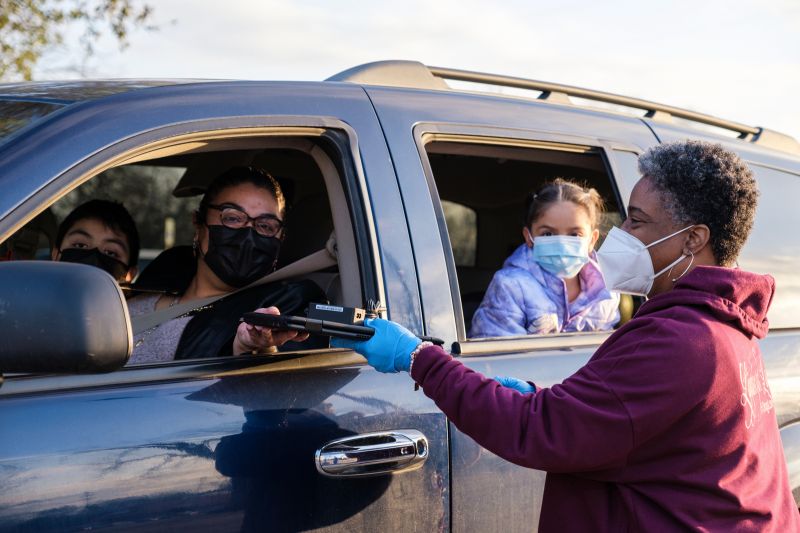We’re Closing the Digital Divide to Improve Access to Education, Income and Health

In today’s fast-paced digital world, high-speed internet, digital skills and digital technology have become a necessity for accessing education, financial stability and health resources. Yet significant portions of North Texas lack access to the digital technology, infrastructure or skills needed to truly thrive.
At United Way of Metropolitan Dallas, improving access to digital technology and skills is a priority as we work to improve access to education, income and health—the building blocks of opportunity. Every North Texas student, worker and family needs to be able to leverage the power and potential of digital technology to succeed in school, build a career and access modern health resources.
That’s why we have partnered with AT&T, Texas Instruments Foundation, The Eugene McDermott Foundation, and the Richard and Mary Templeton Foundation to establish and grow Digital Bridges, which seeks to improve access to digital technology so more North Texans are equipped to succeed in school, find and keep good-paying jobs, and access the health resources they need to thrive.
Keep reading to learn more about the technology challenges that plague our community, as well as how United Way and our partners are driving change through programs like Digital Bridges.
Technology Access in North Texas
The digital divide is the gap between those who have access to digital technology and skills and those who don’t. This divide has existed for decades, but the COVID-19 pandemic highlighted the significant challenges that students, workers and families experience when they don’t have access to the technology or skills they need to succeed.
This is a significant problem in our community. At the height of the pandemic, about a quarter of Dallas County households earning less than $50,000 didn’t own a computer, according to county officials. And according to the latest U.S. Census, 42% of Dallas households lacked fixed internet access, meaning Dallas had the worst household connection rate among major Texas cities and the sixth worst city in the country.
Here are just a few examples of how technology limitations hold many of our neighbors back:
- Millions of students across the country cannot connect to online learning opportunities from home because they don’t have reliable internet access or a computer at home.
- Many North Texas workers lack digital literacy skills, which prevents them from accessing the resources that could enable them to advance in their careers and achieve financial stability.
- Many families in our community can’t afford broadband internet, which means they can’t take advantage of convenient digital health resources such as telehealth visits.
Unfortunately, people in communities that have been historically underserved, which includes Southern Dallas, are most likely to lack digital technology and skills. As a result, these folks often fall behind at school, in their careers and in other areas of life. This stark digital divide also leads to gaps in outcomes in health and life expectancy.
According to Bill Zielinski, the City of Dallas’ chief information officer, areas that lack internet access also tend to be “infrastructure deserts”—lower-income areas without access to services like public transportation, hospitals and food.
Sadly, infrastructure deserts are all too common in North Texas. A 2022 SMU study identified 62 areas in Dallas alone, pointing to the need for organizations like United Way to work with partners to fill in the gaps.
Improving Technology Access through Digital Bridges
The idea for Digital Bridges, our partnership with AT&T, Texas Instruments Foundation, the McDermott Foundation, and the Templeton Foundation, was born during the height of COVID-19, when students across North Texas were expected to quickly pivot to remote learning. Unfortunately, many families didn’t have the technology necessary to support online learning, highlighting the stubborn digital divide that can hold students back, even during a typical school year.
COVID revealed an opportunity to unite our community to improve technology access in North Texas. Through Digital Bridges, we distribute laptops to students and young adults across Southern Dallas to enable them to access education, further their learning and stay connected in the classroom and beyond. Through our partnership with Compudopt, the laptops come with two years of warranty and bilingual technical assistance to ensure families can make the most of the technology. Recently, we also began providing digital literacy classes through the program, with a goal of enrolling 1,000 individuals in these courses by 2025.
Last year, United Way and our partners distributed nearly 1,700 laptops and provided digital literacy classes to 165 young Southern Dallas residents. Compudopt estimates that by distributing nearly 1,700 computers last year, the program had impacted more than 5,400 North Texans, since most laptops will be used by multiple people in a household.
For folks like Deambra Green, whose five daughters received digital technology through Digital Bridges, the program can be transformative.
“The laptops we received help complete missing assignments and get caught up,” she explained. “I’ve seen a drastic increase in their grades. The biggest victory is that my oldest daughter will graduate on time. She went from not caring about graduating to now wanting to attend community college.”
Cathy Lee, director of education and career success at United Way of Metropolitan Dallas, affirms that digital access touches every part of a family’s life.
“So many jobs, programs and services have gone virtual in the four years since the pandemic, which means that digital access is critical for North Texas families,” she said. “These devices and opportunities for greater connectivity enable our students in Southern Dallas to continue their learning. The program also ensures families can access a broad range of other important supports, like accessing healthcare, applying for schools and jobs, booking telehealth appointments and more. This initiative is a great start, but we need to keep going to ensure that every family has the access they deserve to these critical resources.”
You Can Improve Technology Access and Literacy in North Texas
Together, we can improve access to digital technology and skills so that every North Texan can thrive. Here are three opportunities to be part of this important work:
- Give: Invest in United Way to support programs like Southern Dallas Thrives that benefit students and their families throughout North Texas.
- Advocate: Sign up for our Advocacy Alerts to receive information on our current policy priorities plus notifications on when and how to connect with your elected officials.
- Volunteer: We frequently organize volunteer programs that expand technology access and literacy. Right now, you can sign up as a Digital Skills Coach, or fill out our volunteer interest form to hear about future opportunities.
Tags

Invest in Lasting Change
When you invest in United Way, you create lasting change right here in our community. The money raised here stays here to improve access to education, income and health so all North Texans can thrive.


